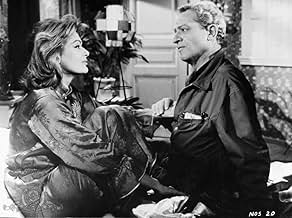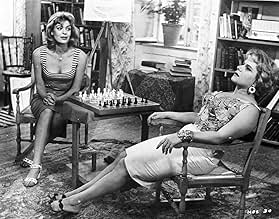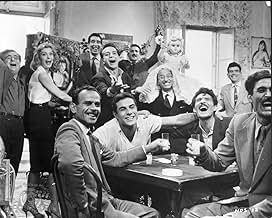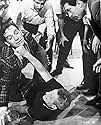ÉVALUATION IMDb
7,3/10
6,3 k
MA NOTE
Ajouter une intrigue dans votre langueAn American scholar in Greece sets about improving the prostitute with whom he is infatuated.An American scholar in Greece sets about improving the prostitute with whom he is infatuated.An American scholar in Greece sets about improving the prostitute with whom he is infatuated.
- A remporté 1 oscar
- 3 victoires et 8 nominations au total
Giorgos Foundas
- Tonio
- (as Georges Foundas)
Dimitris Papamichael
- British Seaman
- (as Dimitri Papamichael)
Thanasis Vengos
- Thanasis
- (as Thanassis Veggos)
Histoire
Le saviez-vous
- AnecdotesFeatures first song ("Never On Sunday") from a foreign-made movie to win an Oscar.
- GaffesAt their first meeting, when Ilya looks at Homer through the viewfinder of his camera, he is looking straight-on at the camera. But when she looks up from the camera, Homer is sitting slightly to her left and has to turn to his right -- and thus is not looking straight-on -- when he speaks to her.
- ConnexionsFeatured in Toute la chanson: Episode dated 30 May 1960 (1960)
Commentaire en vedette
"Never on Sunday", that charming Jules Dassin film, was shown unexpectedly on cable recently. The inspired story of a happy prostitute working the waterfront of Piraeus, was a smash hit everywhere when it first came out. Mr. Dassin's love poem to Greece, a land he loved, added another layer to his distinguished career. Not being known for light comedies, this movie strikes the right tone from the start. The director himself decided to play the pivotal role of Homer Thrace, a Brooklyn scholar familiar with Greek culture, but naive in matters of the heart and sex.
Ilya, a happy-go-lucky prostitute, is loved by the men working in the port. She has no hangups, something, that in contrast, Homer is full of. After all, he came from a society where sex was for the most part a taboo for the society he came from during the time period where the action takes place. After all, America was not a sexually liberated country. Ilya, on the other hand, was free to share her services openly, as she saw fit without any problem. In a way, the relationship that develops between Homer and Ilya, is a modified version of Pygmalion and Galatea, something that Homer was happy to undertake, even though he knew better not to try.
Melina Mercouri dominates the film. She obviously enjoyed getting inside her character as it clearly shows on the screen. She gave a bigger than life reading in what was her best role in the movies. Ms. Mercouri's effortless performance wins the viewer right away because one realizes she is, like Fellini's Cabiria, a genuine soul that gives love without expecting anything in return.
Jules Dassin has been criticized by some contributors to IMDb by his take on Homer, but actually, he also gives an appealing account of his scholar. Not being an actor, he understood what he wanted to accomplish with this Brooklyn man that has spent most of his life around books, but not around real life, something he finds living among the earthy people around the Greek port where he spends his vacation. In fact, he kept reminding this viewer of this type of individual that is more at home among books than with real people.
The black and white cinematography of Jacques Natteau, enhances the film and the background in which it was filmed. Manos Hatzidakis' delightful music score plays well in the story and it's never out of touch with what the director conceived. Ultimately, the film was another triumph for Jules Dassin, an American original whose body of work speak for itself.
Ilya, a happy-go-lucky prostitute, is loved by the men working in the port. She has no hangups, something, that in contrast, Homer is full of. After all, he came from a society where sex was for the most part a taboo for the society he came from during the time period where the action takes place. After all, America was not a sexually liberated country. Ilya, on the other hand, was free to share her services openly, as she saw fit without any problem. In a way, the relationship that develops between Homer and Ilya, is a modified version of Pygmalion and Galatea, something that Homer was happy to undertake, even though he knew better not to try.
Melina Mercouri dominates the film. She obviously enjoyed getting inside her character as it clearly shows on the screen. She gave a bigger than life reading in what was her best role in the movies. Ms. Mercouri's effortless performance wins the viewer right away because one realizes she is, like Fellini's Cabiria, a genuine soul that gives love without expecting anything in return.
Jules Dassin has been criticized by some contributors to IMDb by his take on Homer, but actually, he also gives an appealing account of his scholar. Not being an actor, he understood what he wanted to accomplish with this Brooklyn man that has spent most of his life around books, but not around real life, something he finds living among the earthy people around the Greek port where he spends his vacation. In fact, he kept reminding this viewer of this type of individual that is more at home among books than with real people.
The black and white cinematography of Jacques Natteau, enhances the film and the background in which it was filmed. Manos Hatzidakis' delightful music score plays well in the story and it's never out of touch with what the director conceived. Ultimately, the film was another triumph for Jules Dassin, an American original whose body of work speak for itself.
- jotix100
- 31 mars 2009
- Lien permanent
Meilleurs choix
Connectez-vous pour évaluer et surveiller les recommandations personnalisées
- How long is Never on Sunday?Propulsé par Alexa
Détails
Box-office
- Budget
- 151 000 $ US (estimation)
- Durée1 heure 31 minutes
- Couleur
- Mixage
- Rapport de forme
- 1.66 : 1
Contribuer à cette page
Suggérer une modification ou ajouter du contenu manquant







































